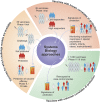Systems vaccinology: probing humanity's diverse immune systems with vaccines
- PMID: 25136102
- PMCID: PMC4151766
- DOI: 10.1073/pnas.1400476111
Systems vaccinology: probing humanity's diverse immune systems with vaccines
Abstract
Homo sapiens are genetically diverse, but dramatic demographic and socioeconomic changes during the past century have created further diversification with respect to age, nutritional status, and the incidence of associated chronic inflammatory disorders and chronic infections. These shifting demographics pose new challenges for vaccination, as emerging evidence suggests that age, the metabolic state, and chronic infections can exert major influences on the immune system. Thus, a key public health challenge is learning how to reprogram suboptimal immune systems to induce effective vaccine immunity. Recent advances have applied systems biological analysis to define molecular signatures induced early after vaccination that correlate with and predict the later adaptive immune responses in humans. Such "systems vaccinology" approaches offer an integrated picture of the molecular networks driving vaccine immunity, and are beginning to yield novel insights about the immune system. Here we discuss the promise of systems vaccinology in probing humanity's diverse immune systems, and in delineating the impact of genes, the environment, and the microbiome on protective immunity induced by vaccination. Such insights will be critical in reengineering suboptimal immune systems in immunocompromised populations.
Conflict of interest statement
The author declares no conflict of interest.
Figures


References
-
- D’Argenio DA, Wilson CB. A decade of vaccines: Integrating immunology and vaccinology for rational vaccine design. Immunity. 2010;33(4):437–440. - PubMed
-
- Rappuoli R, Aderem A. A 2020 vision for vaccines against HIV, tuberculosis and malaria. Nature. 2011;473(7348):463–469. - PubMed
-
- Medawar P. 1959. The Future of Man. The Reith Lectures, 1959. BBC Radio 4. Available at http://downloads.bbc.co.uk/rmhttp/radio4/transcripts/1959_reith4.pdf. Accessed June 4, 2014.
Publication types
MeSH terms
Substances
Grants and funding
- R37 AI048638/AI/NIAID NIH HHS/United States
- U19 AI090023/AI/NIAID NIH HHS/United States
- UM1 AI100663/AI/NIAID NIH HHS/United States
- R37DK057665/DK/NIDDK NIH HHS/United States
- U19AI090023/AI/NIAID NIH HHS/United States
- P51 OD011132/OD/NIH HHS/United States
- U19 AI057266/AI/NIAID NIH HHS/United States
- U19AI057266/AI/NIAID NIH HHS/United States
- U54AI057157/AI/NIAID NIH HHS/United States
- R37 DK057665/DK/NIDDK NIH HHS/United States
- AI100663-02/AI/NIAID NIH HHS/United States
- R37AI48638/AI/NIAID NIH HHS/United States
- U54 AI057157/AI/NIAID NIH HHS/United States
LinkOut - more resources
Full Text Sources
Other Literature Sources
Medical
Miscellaneous

